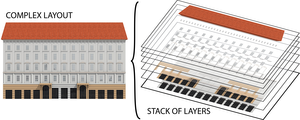Information
- Publication Type: Journal Paper with Conference Talk
- Workgroup(s)/Project(s):
- Date: May 2015
- Journal: Computer Graphics Forum
- Volume: 34
- Number: 2
- Location: Zürich
- Lecturer: Martin Ilčík
- ISSN: 1467-8659
- Event: Eurographics
- Conference date: 4. May 2015 – 8. May 2015
- Pages: 205 – 216
- Keywords: procedural modeling
Abstract
We present a novel procedural framework for interactively modeling building façades. Common procedural approaches, such as shape grammars, assume that building façades are organized in a tree structure, while in practice this is often not the case. Consequently, the complexity of their layout description becomes unmanageable for interactive editing. In contrast, we obtain a façade by composing multiple overlapping layers, where each layer contains a single rectilinear grid of façade elements described by two simple generator patterns. This way, the design process becomes more intuitive and the editing effort for complex layouts is significantly reduced. To achieve this, we present a method for the automated merging of different layers in the form of a mixed discrete and continuous optimization problem. Finally, we provide several modeling examples and a comparison to shape grammars in order to highlight the advantages of our method when designing realistic building façades. You can find the paper video at https://vimeo.com/118400233 .Additional Files and Images
Additional images and videos
 teaser:
Decomposition of a facade into layers.
teaser:
Decomposition of a facade into layers.
Additional files
 preprint:
Draft of the paper
preprint:
Draft of the paper
 Supplementary:
Supplementary material with further details
Supplementary:
Supplementary material with further details
Weblinks
BibTeX
@article{Ilcik_2015_LAY,
title = "Layer-Based Procedural Design of Facades",
author = "Martin Il\v{c}\'{i}k and Przemyslaw Musialski and Thomas
Auzinger and Michael Wimmer",
year = "2015",
abstract = "We present a novel procedural framework for interactively
modeling building fa\c{c}ades. Common procedural approaches,
such as shape grammars, assume that building fa\c{c}ades are
organized in a tree structure, while in practice this is
often not the case. Consequently, the complexity of their
layout description becomes unmanageable for interactive
editing. In contrast, we obtain a fa\c{c}ade by composing
multiple overlapping layers, where each layer contains a
single rectilinear grid of fa\c{c}ade elements described by
two simple generator patterns. This way, the design process
becomes more intuitive and the editing effort for complex
layouts is significantly reduced. To achieve this, we
present a method for the automated merging of different
layers in the form of a mixed discrete and continuous
optimization problem. Finally, we provide several modeling
examples and a comparison to shape grammars in order to
highlight the advantages of our method when designing
realistic building fa\c{c}ades. You can find the paper video
at https://vimeo.com/118400233 .",
month = may,
journal = "Computer Graphics Forum",
volume = "34",
number = "2",
issn = "1467-8659",
pages = "205--216",
keywords = "procedural modeling",
URL = "https://www.cg.tuwien.ac.at/research/publications/2015/Ilcik_2015_LAY/",
}


 preprint
preprint